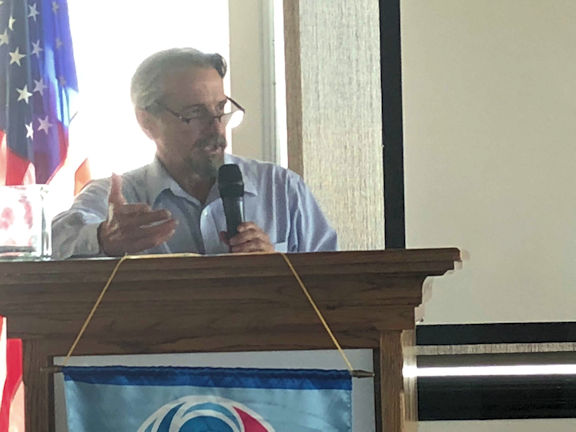
John Krist of Ventura County Farm Bureau
Discusses the Future of Agricultural Water
If you've driven around the agricultural fields of Ventura County, you've probably seen signs that read "Food grows where water flows." Kind of an obvious statement, but a true one nonetheless. Our speaker on Monday, November 5, was John Krist, CEO of the Ventura County Farm Bureau, an advocate agency for the local agriculture industry. John presented a fascinating look at the history, current status, and future challenges of water in the region.
To give members and guests of Rotary Ventura South an idea of the critical importance that water plays, John noted that a single strawberry crop requires three acre feet of water. or roughly one million gallons. In Ventura County, that water comes from four principal sources: local groundwater (63%), the State Water Project (25%). local surface water (8%), and recycled water (4%).
With the heavy dependence on local wells, John explained that careful management of the groundwater basins, from Ojai to the Oxnard Plain, is vital. A delicate balance must be maintained to avoid over-drafting, taking out more than is going in over the course of years. That balance becomes particularly hard to achieve in times of drought.
Many years ago, John noted, before the County was developed, the groundwater wells were artesian - that is, they bubbled up from the ground under natural pressure. At the same time, the Santa Clara River had a constant year-round flow. Now, of course, the groundwater must be pumped and the Santa Clara riverbed is dry most years.
All of this boils down (so to speak) to a challenge for farmers: how to manage their supplies in the most efficient way. Legislation passed in 2014 mandates groundwater management plans for every basin, and significant investments are being made in technologies such as desalting of brackish water and the use of indirect potable reuse for recycled water.
John acknowledged the challenge is significant, but he added, "We have a long history of managing our groundwater basins intelligently."

